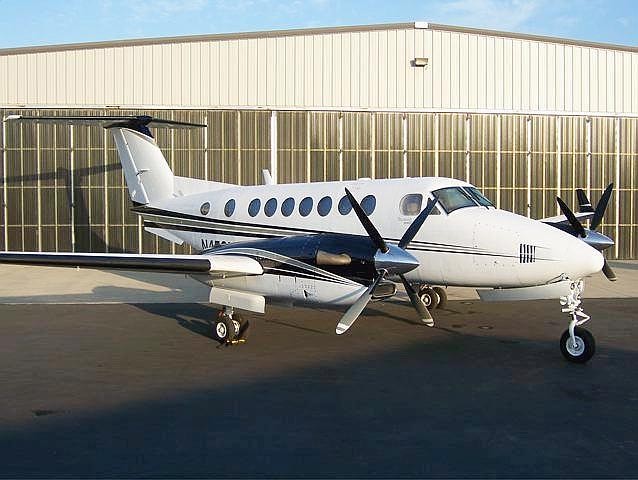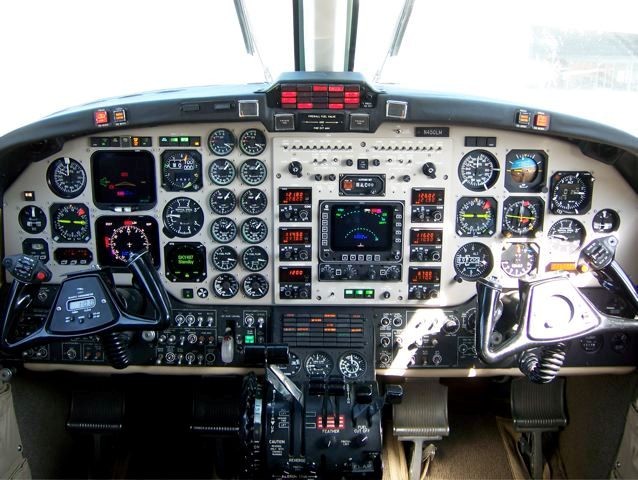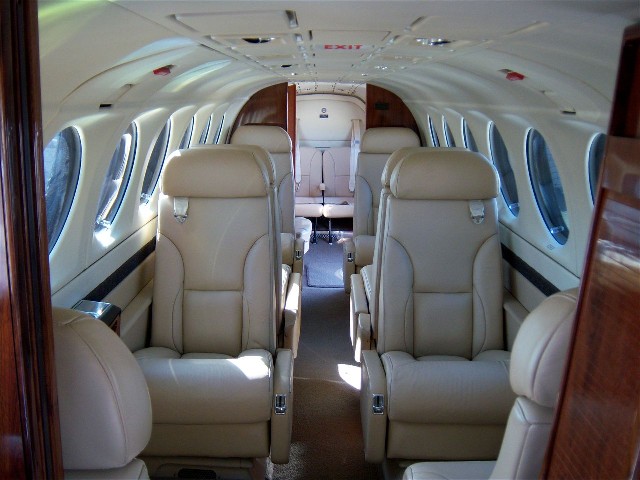


Aircraft Description
Background/History
In January 1964, the first Beechcraft 65-90 took to the air. Based on the piston-engined Model 65 Queen Air, the -90 featured the then-new Pratt & Whitney Canada PT6A turboprop powerplants in place of the earlier 65’s Lycoming flat-six piston engines. A pressurized model was developed, and was designated the King Air 90. Many variants followed, including the stretched King Air 100, and the further-stretched Super King Air 200, which was certificated in 1973. This was followed by the Super King Air 300, which was powered by the -60A variant of the PT6A engine. These more powerful engines gave the new Super King Air faster cruise speed and better climb performance than the 200series aircraft, with virtually the same range. The Super King Air 300 was granted FAA certification in January 1984, with deliveries beginning in April of the same year. After a production run of 225 aircraft, the King Air 300 was discontinued in 1993 in favor of the larger Super King Air 350.
Power
The Super King Air 300 is powered by a pair of Pratt & Whitney Canada PT6A-60A turboprop engines rated at 1,050 shp each, driving four blade, full feathering, reversible constant speed propellers. Engine inspection interval is 3,600 hours.
Avionics
A typical installation for the Super King Air 300 includes dual Collins VHF 22A comms, dual VIR 32 navs, dual DME, dual ADF 60A, Collins FDS85 flight director system, Collins APS65 autopilot, and Sperry 300 color weather radar.
Design Features
The Super King Air 300 is a pressurized, twin-engine turboprop business aircraft configured as a cantilever low-wing monoplane with a T-tail and aft ventral fin. It has retractable tricycle landing gear with dual wheels on each main unit. A large airstair door is located on the aft port side of the fuselage.
Accomodations
The Super King Air 300 can be configured in a variety of seating arrangements, but is commonly configured for eight passengers in a combination of a club and individual or divan seating. The lavatory is located aft of the main seating, and a large baggage compartment occupies the aft cabin. Cabin height is 4.8ft., cabin width is 4.5ft. And length is 16.7ft.
| General | King Air 300, BE-300 | |||
|---|---|---|---|---|
| Category | Multiengine Turboprop > 12,500 lbs. | |||
| Years Aircraft Manufactured | 1984 – 1993 | |||
| Serial Number Range | FA-1 – FA-230 | |||
| Retail High Price | $2,395,000.00 / 1,879,356.50€ | |||
| Retail Low Price | $995,000.00 / 780,776.50€ | |||
| Characteristics | King Air 300, BE-300 | |||
| Seating | 1+7/15 | |||
| Wing Loading | 46.2 | |||
| Power Loading | 6.7 | |||
| Noise(EPNdB): Takeoff/Sideline/Approach | 72.1 | |||
| External Dimensions (ft) | King Air 300, BE-300 | |||
| External Length | 43.8 | |||
| External Height | 14.3 | |||
| External Span | 54.5 | |||
| Internal Dimensions (ft) | King Air 300, BE-300 | |||
| Internal Length (Overall/Net Height) | 16.7 | |||
| Internal Height | 4.8 | |||
| Internal Width (Max/Floor) | 4.5 | |||
| Baggage | King Air 300, BE-300 | |||
| External: Cu.Ft./Lb. | N/A | |||
| External: Cu.Ft./Lb. | N/A | |||
| Power | King Air 300, BE-300 | |||
| Engines | 2 P&WC PT6A-60A | |||
| Output (lbs ea.)/Flat Rating | 1,050shp | |||
| Inspection Interval | 3,600t | |||
| Data based on latest manufactured year | ||||



